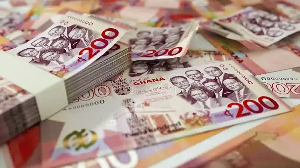Prior to the 2016 general elections, there was unobjectionable evidence which showed an exponential decline in the contributions of the agricultural sector to the national Gross Domestic Products (GDP).
Take, for instance, the agricultural sector grew a favourable 7.4% by 2011. However, due to dreadful errors in decision-making, the agricultural growth declined sharply to just around 2.4% by December 2016, at the time the NDC government was exiting power.
So, as expected from serious, committed and forward-thinking leaders, the then opposition NPP made a campaign promise to introduce an economic boosting programme, with a melodious nomenclature: ‘Planting for Food and Jobs’.
And, lo and behold, the good people of Ghana found in NPP, a redeemer, in whom they reposed their absolute trust to set them free from the NDC government’s economic bondage.
To their credit, though, upon winning the 2016 general elections, the Akufo-Addo’s government rolled-up the programme, and the rest is history.
There is no denying or hiding the fact that some people go into politics for the love of their nation, while others just see power as an opportunity to amass wealth.
Indeed, the available evidence shows that some people enter into politics with a view to enjoying the power and satisfying their egos.
Unfairly, however, we tend to put all politicians in one basket and then pass judgement over their conduct.
“When all parties turn out to be the same once in power, people lose faith in all parties, and ultimately in democracy.”
Well, the notion that all politicians behave in the same manner once they are in power is somewhat sophistic, so to speak.
I have always maintained that despite the widely held notion that Ghanaian politics is full of inveterate propagandists and manipulating geezers, we have many selfless, morally upright and forward-thinking politicians in our midst.
So, I was not least surprised at all when I once heard the former NDC Member of Parliament for Ejura Sekyedumase Constituency in the Ashanti Region, Hon. Alhaji Panga Bu, honestly and passionately attesting to the NPP government’s well-thought-through Planting for Foods and Jobs programme on Asempa FM on Thursday 25th October 2018.
The former policymaker stressed: "let me plead with my party members that they should see some calls as a national one. We should desist from playing politics with every important national issue. The Planting for Food and Jobs programme is a national call and I want my party members to embrace it."
The seemingly honest and thoughtful former NDC policy maker, however, maintained that he is a living testimony to the successes of the innovative Planting for Foods and Jobs programme.
According to the hardworking former NDC Member of Parliament, he defied his party’s needless opposition and embraced the seemingly advantageous Planting for Foods and Jobs programme.
He revealed: “since the NPP government implemented the Planting for Foods and Jobs programme, I have witnessed a vast number of NDC members in Ejura Sekyedumase constituency who have benefited from the programme. So I am wondering why my party continues to speak against it."
The former policymaker however admitted that he employed more than 500 workers, sowed and harvested over 1000 acres of maize through funding from the Planting for Foods and Jobs programme.
Sadly, though, despite raking millions of Cedis from the programme and owning a luxurious vehicle (Toyota Land Cruiser) as a result, some NDC loyalists have been castigating him for partaking in ‘NPP government’s initiative’.
There is no denying or hiding the fact that Ghanaian politics is characterised with vindictiveness, bitterness, dishonesty, hypocrisy, backbiting, amongst others.
If that was not the case, what would then drive party brassbound supporters to unfairly and crudely attack a patriotic Ghanaian, whose only crime was to support an advantageous programme being implemented by the ruling government?
That said, in so far as we are disgusted with the supporters revoltingly ugly behaviour, we can sympathise with them for falling prey to the manipulating politicians gimmicks.
Indeed, the unsuspecting supporters have been brainwashed by their leaders to believing that the innovative Planting for Foods and Jobs programme was only transposed into NPP’s Manifesto as a means to attract votes.
Absolutely, the opposition is obliged to put the incumbent government on its toes. But Do the opposition NDC operatives have to grumble and oppose for opposing sake?
“Being in Opposition is not just about opposing the Government. “There are occasions when the Opposition agrees with the Government if the solution proposed by the Government has wide support, and is soundly based, then it’s only natural for the Opposition to agree (Dr Brash).”
In as much as I do not want to accept the widely held assertion that politics is a dirty game, it would not be farfetched to suggest that the political terrain is full of manipulating geezers.
Of course, political manipulators are not limited to Africa. It is a global phenomenon, as a matter of fact.
However, in my view, it is our part of the world (Africa), where political gimmicks and insobrieties are so prevalent.
Perhaps, this is so because we have a greater number of unlettered folks, many of whom cannot choose between tricksters and morally upstanding politicians.
Whatever the case, it is extremely worrying to witness an opposition party whose responsibility is to provide a credible opposition by propounding alternative solutions, and yet disappointingly turning away from its core duty and rather engaging in needless propaganda.
I was indeed not least surprised when I read that following the implementation of the Planting for Food and Jobs programme, Ghana is now in a position to export foodstuffs to neighbouring Burkina Faso and Cote d’Ivoire, according to the statistics from the Ministry of Food and Agriculture (graphic.com.gh, 9/01/2019).
The report delineated somewhat delightfully that at the Ejura Market in the Ejura Sekyeredumase municipality in the Ashanti Region alone, about 2,008 tonnes of yellow maize and 2,174 tonnes of white maize were exported to Cote d’Ivoire and Burkina Faso, respectively, at the end of 2018.
The Ministry of Food and Agriculture data, according to the graphic.com.gh, the Ejura Sekyeredumase Municipal Department of Agriculture reported that an additional 1,291 tonnes and 144 tonnes of cowpea were exported to Burkina Faso and Cote d’Ivoire, respectively, while 296.88 tonnes of yam went to Cote d’Ivoire alone.
In the Ashanti Region, the data shows an impressive export of agricultural commodities to the two countries.
The data shows that 13,394 tonnes of plantain were exported from the Abofour Market in the Offinso municipality to Burkina Faso.
According to the report, at the same market, 16,413 tonnes of banana were exported to Burkina Faso in 2018.
And between May and October 2018, between 1,200 and 1,912 tonnes of banana were exported to Burkina Faso.
Moreover, about 3,275 tonnes of citrus and 1,465 metric tonnes of pawpaw were carted from the same market to Burkina Faso in 2018.
The data shows that 1,655 tonnes of ginger were exported, while 2,294 tonnes of palm fruits and 2,207 metric tonnes of palm oil were all exported to Burkina Faso.
At the Tumu Market in the Upper West Region, the report shows that 11,187 tonnes of food produce, including white and yellow maize, sorghum, soya beans, cowpea, banana, gari, orange and yam, were exported to Burkina Faso alone (Source: graphic.com.gh, 9/01/2019).
In sum, the initiation of the Planting for Food and Jobs programme shows how prudent and effective governance can change a country’s fortunes overnight.
Opinions of Sunday, 17 February 2019
Columnist: K. Badu, UK















